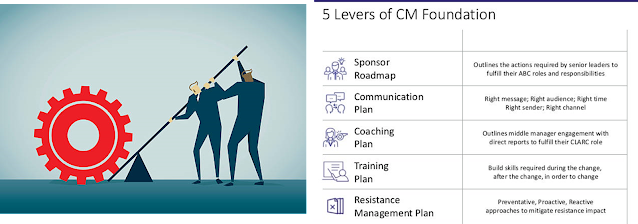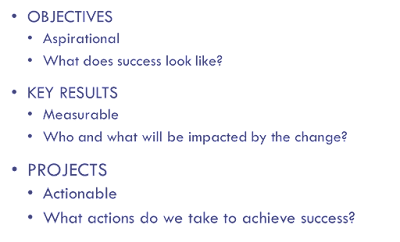If employee experience is making sure that the people in the organization are put at the center, then it already shares a natural affinity with change management. This is part two, a continuation of an earlier blog post, which detailed the Viva modules as we know them today and what the future holds. In this post, we'll explore how that set of tools is perfect for helping our organizations to manage change.
First of all, let's clarify that change management in this context refers to the people side of change, not change control, the process of managing technology changes that are pushed to production. I like to say, "Technical change is human change . . . every time." The best designed software or most exquisitely planned process is only as good as our ability to understand it and see value in learning it.
Change managers, using methodologies like ProSci or CCMP complement project managers and IT resources to drive faster adoption, higher utilization, and greater efficiency. In ProSci, we have a model representing how individuals experience change, called ADKAR.
A - Awareness of the need to change and what the change impacts will be.
D - Desire to participate in and support the change knowing its value
K - Knowledge of how to successfully use new tools or processes
A - Ability to implement the new behaviors and fully adopt the change
R - Reinforcement to sustain the change over time
While there are a number of aspects of a person's job that can be impacted with technology changes in an organization, I think we can boil this down to three simple elements - mindset, toolset, and skillset. To make change initiatives successful, we need to alter the way we think about the work we're doing and how new technology can help us. We need to learn the ins and outs of the new tools so we can develop proficiency. We need to develop the skills over time to make the changes work to our benefit.
To help us implement these changes, ProSci recommends 5 levers of change management. These are also called "pillars" or "plans." The term "levers" speaks to me the most, because these are the mechanisms we can use to get successful change momentum started.
Using these levers well relies on us first preparing for and planning for successful change. The 3-phase process recommended by ProSci is shown on the right.
So, the first thing we do in a change initiative is to define objectives, key results, and the specific actions that we need to take to define our approach. That sounds tailor made for Viva Goals
Viva Goals
According to Microsoft, "Viva Goals is a goal-alignment solution that connects teams to your organization’s strategic priorities, unites them around your mission and purpose, and drives business results. To do this, Microsoft Viva Goals applies the power of the objectives and key results (OKR) framework." This OKR framework is well-suited to help us in phase one of the change process.
You can find more information on Viva Goals and OKRs at these links:
ADKAR = VIVA
Once we begin implementing the change process, ADKAR takes a front and center role in helping to guide the process and build the right outcomes. I believe that each letter maps very well to a module in Viva to help us implement it. The Viva suite quickly becomes an invaluable OCM toolbox.
Awareness = Connections and Amplify
We need to let employees know what is changing and why the change is necessary and beneficial. We need to clearly communicate the need for change and the risk of not changing. The communication planning pillar needs solid tools for creating key messages and getting them in the hands of the right people.
Viva Connections has been your intranet deployed as a Microsoft Teams app. That is changing between now and March into a landing spot for Viva with links to your important internal sites, adaptive cards that can display org-wide or audience-targeted communications, and a place to highlight SharePoint news articles.
Viva Amplify is still in the early preview stages but holds the promise of becoming a great way to not only create but distribute and manage employee communications as part of campaigns. It looks like any experience building SharePoint news will come in handy and writing guidance will be provided as well. Analytics about campaign engagement will be included and a sorely missing aspect within current tools. If you're interested, you can sign up for the preview program here -
https://tinyurl.com/2s4222np.
Desire = Viva Engage and People in Viva
Once awareness is well established, we can turn our efforts to building desire. This is a strong focus on the why (the organizational value) and the WIIFM (what's in it for me). Since sharing successes early and often is so important here, the building of a champions community is critical to success. What better way to build a community with a mix of official announcement and employee-generated collaboration through Viva Engage.
While Yammer still exists as a service and a site, we have a more tightly integrated experience with Microsoft Teams by adding Viva Engage. Answers in Viva will be an experience that groups questions and answers (along with the number of upvotes) across communities into one searchable location.
Other experiences like Storylines and Leadership Corner give us ways to tell our stories and connect with visible and engaged sponsors. Viva Engage encourages open sharing and contribution of knowledge, questions, answers, and ideas.
People in Viva will be coming soon as a separate module which will build on the Organization tab in Teams allowing us to see how people relate to Viva Goals, Viva Topics, other people, and ideas within the organization. Finding the right SMEs quickly helps us adopt change more effectively.
Knowledge = Viva Learning and Viva Topics
Often, I've found that organizations go straight to knowledge without first building awareness or desire. Once our people understand the why and the WIIFM, we need to know how new tools and processes are going to work, and how our daily routine will be impacted. Knowledge is crucial and having a variety of learning methods ensures greater retention and deeper adoption.
Viva Learning is a natural fit here. It is a module designed for self-service learning. Initially, we can connect it to basic LinkedIn Learning content as well as Microsoft Learn topics. We can also build a catalog of our own internal courses using SharePoint Online. With premium licensing, we can connect to a number of third-party learning sources including Workday, Saba, Pluralsight. This has the potential of making Viva Learning a one stop shop for all of the organization's learning needs, not just ones related to our specific change initiatives.
Viva Topics is a product only available with a premium or Viva Suite license. It uses SharePoint search, investments into AI like Microsoft Syntex, and the Microsoft Graph to identify central topics within documents and produce suggested topic pages. Knowledge managers can curate these and accept or publish them, resulting in clickable Topics cards within a variety of apps in M365. These cards provide people, documents, sites, and related topics all in one spot right where people are working, without having to spend time searching for what they need. Topic card links show up in SharePoint pages, the Viva Topic center site, Microsoft search results, Outlook on the Web, Word/Excel/PowerPoint Online, Microsoft Teams chats, Yammer conversations, and soon in your daily briefing email from Viva Insights.
Ability and Reinforcement = Viva Insights and Viva Pulse
The final two aspects of the ADKAR model likely take the longest as time is the factor in turning knowledge into ability. Reinforcement is an ongoing reminder of why we made the change and revisiting the value proposition to company and employee alike.
Viva Insights is a tool for helping employees maintain well-being while also being productive. The daily and weekly briefing emails deliver personal insights that can help protect our time and our sanity. Manager and organizational insights are premium reports that are anonymized. Since people managers are so important for their connections to employees, they automatically take on a role of change champion while also figuring out adaptation to change for themselves.
Viva Pulse is a module that's coming soon and will continue to support managers by helping them further the two-way communication with their direct reports through research-backed questionnaires and an option to have employees initiate feedback.
Conclusion
Change managers must regularly use all the tools and creativity at their disposal to help guide the people of an organization through change to increase adoption and drive ROI. The Viva suite may just make that job a whole lot easier.





